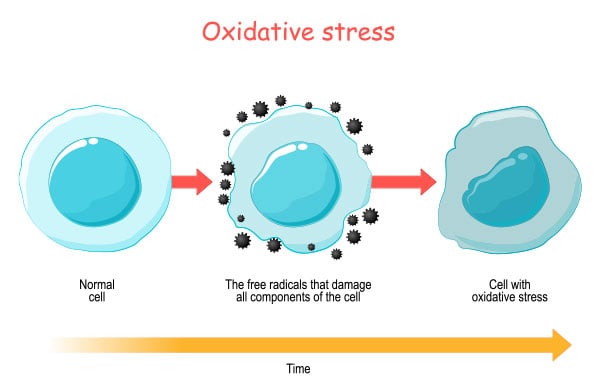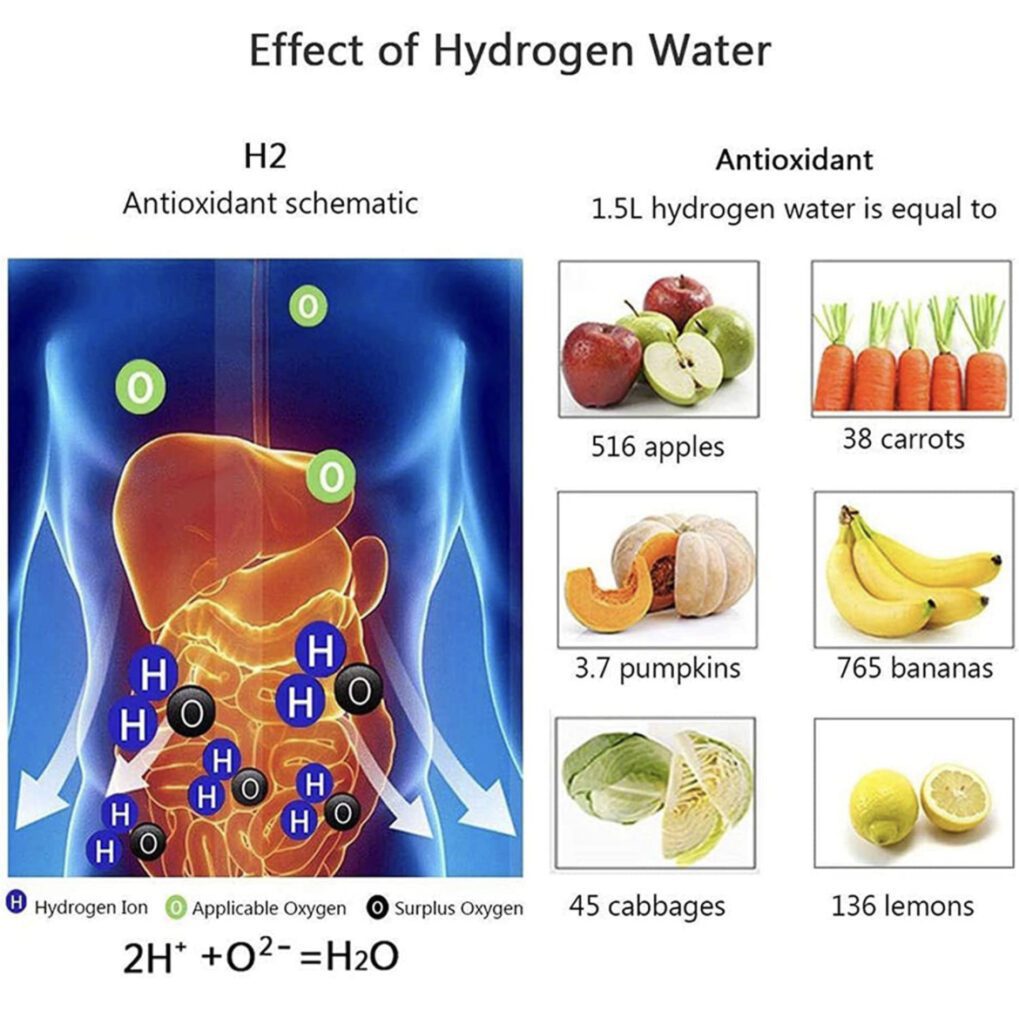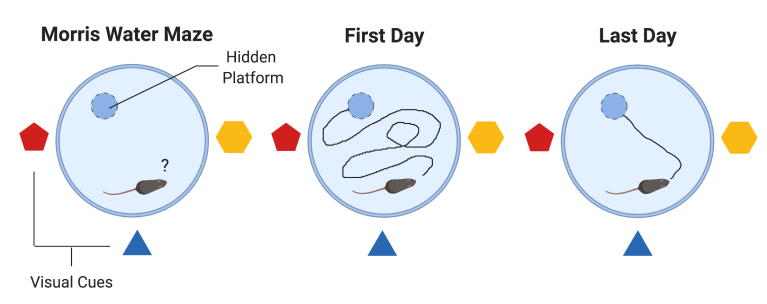A concussion is a mild traumatic brain injury (TBI) that can cause a range of challenges, including physical, emotional, autonomic, vestibular, oculomotor, sleep, and cognitive problems, along with a myriad of other symptoms. Despite the common perception that sports cause most concussions, only about 1 in 7 are sports-related. Instead, other injuries, such as falls, motor vehicle accidents, and assaults, are more likely to cause concussions. Although most people recover within a few weeks, some may experience persistent symptoms lasting for months or even years. See: "Does Everyone Recover From a Concussion?"
Recent research has shown that molecular hydrogen (H2) has potential therapeutic effects on various neurological conditions, including traumatic brain injury. H2 is a colorless, odorless, and tasteless gas studied for its antioxidant, anti-inflammatory, and anti-apoptotic properties. This article will explore how molecular hydrogen can benefit concussions and promote recovery.

Molecular hydrogen is the smallest molecule in the universe and has potent antioxidant, anti-inflammatory, and neuroprotective properties. These properties make it an attractive candidate for treating various conditions, including diabetes, heart disease, and neurological disorders. In recent years, there has been growing interest in the potential of molecular hydrogen to benefit concussion patients.
Molecular hydrogen has been studied for its potential therapeutic effects on various health conditions for decades. However, its use as a medical therapy is relatively recent, with the first clinical trials conducted in the early 2000s. One of the earliest reports of the medical use of molecular hydrogen was in 1975, when it was first used to treat decompression sickness in deep-sea divers. This condition, also known as the bends, occurs when nitrogen gas bubbles form in the blood vessels and tissues due to rapid decompression, sometimes causing severe pain, possible death, and other symptoms. Hydrogen was used as a therapeutic gas to reduce the severity of the symptoms and improve outcomes in affected divers. Since that time, research on the medical applications of molecular hydrogen has expanded to include a wide range of health conditions, including but not limited to neurological disorders, cardiovascular diseases, metabolic disorders, and cancer.
Hydrogen has antioxidant and anti-inflammatory effects that dampen oxidative stress and inflammation, accompanying nearly every disease affecting all humans. Another "out of this world" issue caused by oxidative stress is neurological deficits and long-term health issues caused by space travel. New research suggests that a little as one hour of space radiation causes damaging levels of oxidative stress, which compromises thinking and decision-making and is one of the greatest challenges for space travel.
For clinicians:
Excessive amounts of reactive oxygen species (ROS) can damage the composition of mitochondrial electron transport chains, disrupt intracellular redox systems, and lead to lipid peroxidation, protein misfolding, and DNA strand breakage. This can trigger oxidative stress, activate the JNK signaling system, up-regulate pro-oxidant genes, and inhibit antioxidants associated with nuclear factor-e2 related factor (Nrf2). As a result, matrix metalloproteinases (MMP) can be induced, along with the secretion of inflammatory chemokines such as tumor necrosis factors (TNFs), interleukin (IL)−1, IL-6, and IL-8, leading to inflammation. Additionally, peroxidation and inflammation can promote cell apoptosis. This can subsequently result in the release of pro-fibrotic cytokines like platelet-derived growth factors (PDGFs), insulin-like growth factors (IGFs), and basic fibroblast growth factors (FGFs), which can promote the differentiation of monocytes into M2 macrophages, enhance fibroblast proliferation and differentiation into myofibroblasts, and amplify inflammation.
One of the primary mechanisms by which molecular hydrogen can benefit a concussion is its ability to reduce oxidative stress. Molecular hydrogen helps mitigate this damage by neutralizing free radicals and, in effect, reducing inflammatory processes in the body along with other tissue stressors.

Oxidative stress occurs when there is an imbalance between the production of free radicals and the body's ability to neutralize them with antioxidants. Overwhelming a person's ability to clear or reduce these harmful interactions in the body can lead to cellular damage and inflammation, worsening the effects of a concussion.
As detailed in "A Simple Guide to a Not-So-Simple Concussion", oxidative stress is a common feature of concussion; it can cause damage to neurons and other brain cells. Several studies have demonstrated the antioxidant effects of molecular hydrogen in animal models of traumatic brain injury. For example, a study published in the journal Brain Research showed that rats exposed to a concussive impact had significantly lower levels of oxidative stress markers in their brains when treated with molecular hydrogen gas.
At the same time, H2 has been shown to activate the Nrf2 pathway, a cellular signaling pathway that regulates antioxidant and anti-inflammatory responses, which can scavenge free radicals and reduce oxidative stress in the brain. By reducing oxidative stress and inflammation, H2 can protect brain cells from further damage and promote recovery after a concussion.

Molecular hydrogen can neutralize free radicals, molecules that can cause oxidative damage, thus reducing oxidative stress. It also leads to upregulating antioxidant enzymes, such as superoxide dismutase (SOD) and catalase. Properly using molecular hydrogen can help protect brain cells and promote healing more than the consumption of any known "superfood".
Another pathway in which molecular hydrogen can benefit concussion patients is through its anti-inflammatory properties. In the case of concussions, the inflammatory response can exacerbate the damage to the brain and prolong the recovery process. Studies have shown that H2 can reduce inflammation in the brain by inhibiting the production of pro-inflammatory cytokines and chemokines. These signaling molecules recruit immune cells to the injury site and promote inflammation. H2 has been shown to reduce the levels of these molecules in animal models of traumatic brain injury, leading to a reduction in inflammation and improved neurological function. By reducing inflammation, molecular hydrogen can help to minimize the damage caused by a concussion.

Inflammation is a natural response of the immune system to injury or infection. Excessive or prolonged inflammation can lead to tissue damage and cell death.
The hydrogen molecule, despite being a weak reducing agent and having a low molecular weight, has the ability to diffuse quickly and pass through cell membranes and lipid bilayers. It can then target the cell nuclei and mitochondria, where there is an abundance of reactive oxygen species (ROS), and selectively neutralize highly reactive toxic ROS, such as -OH. Recent studies have also shown that hydrogen has a positive effect on the Nrf2 pathway, which is a crucial regulator of electrophilic/antioxidant homeostasis and helps maintain the functional integrity of cells during oxidative stress conditions. Hydrogen activates the Nrf2-Keap1 system, triggers the activation of antioxidant response elements (AREs), and promotes the expression of multiple cytoprotective proteins, including glutathione, catalase (CAT), superoxide dismutase (SOD), glutathione peroxidase, and heme-1 oxygenase. It also activates the transcription factor FoxO1, reduces the damage of -OH to mitochondria, and inhibits the overproduction of ROS. Additionally, hydrogen inhibits the infiltration of phagocytes to sites of inflammation, thereby preventing the subsequent release of reactive substances, and down-regulates various pro-inflammatory and inflammatory cytokines such as interleukin (IL)-1β, IL-6, TNF-α, and intracellular adhesion molecules (ICAM)-1, thus achieving an anti-inflammatory effect. Moreover, hydrogen also weakens abnormal expression of miRNA associated with brain injury.
Following a concussion, there is often an energy imbalance caused by a decrease in glucose uptake by neurological tissue. Glucose is critical in the production of a cellular energy molecule called ATP. If a brain cell cannot access glucose, it cannot make ATP, leading to cell death and neurological dysfunction. Molecular hydrogen may mitigate this by increasing glucose uptake and providing a supplemental fuel source for mitochondria to produce ATP in the brain.
One of the unique properties of molecular hydrogen is its ability to penetrate cell membranes and reach the mitochondria, which are the cell's powerhouses. Mitochondrial dysfunction is a common feature of TBI. It can contribute to developing symptoms such as fatigue and cognitive impairment. By reaching the mitochondria, molecular hydrogen can help to restore their function and promote healing. Several studies have shown that molecular hydrogen can improve energy metabolism in the brain. For example, a study published in the journal Medical Gas Research found that rats treated with molecular hydrogen had higher brain ATP levels than untreated rats.
Molecular hydrogen has also been shown to have a neuroprotective effect. In animal studies, molecular hydrogen has been shown to protect against neuronal damage and cell death.
Apoptosis is programmed cell death that occurs in response to injury or stress. Excessive apoptosis can lead to cell death and tissue damage. H2 has been shown to inhibit apoptosis in the brain by regulating the expression of pro- and anti-apoptotic proteins such as BCL-2 and caspase-3. In animal models of traumatic brain injury, H2 has been shown to reduce apoptosis in the brain and improve neurological function.
Hydrogen exhibits cytoprotective properties that improve cell apoptosis. Apoptosis plays a crucial role in the progression of concussion-related brain injury. By significantly inhibiting the ectopic expression of the death promoter Bcl-2 related X protein (bax) and the expression of caspase-3, while promoting the expression of the anti-apoptotic protein Bcl-2, hydrogen can effectively provide cytoprotection.
Hydrogen also enhances blood perfusion and reduces vascular damage caused by concussion. Vascular injury and endothelial dysfunction are key factors in the development of traumatic brain injury. Excitotoxic brain activity and metabolic failure leads to the excessive production of reactive oxygen species (ROS) and the depletion of vascular protectant nitric oxide (NO) within a few minutes, resulting in the nitrosylation of protein tyrosine residues and lipid peroxidation. This ultimately weakens the vasomotor response, causing vascular stenosis. Furthermore, after concussion, NADPH oxidases (NOXs), especially NOX2 and NOX4, which are abundantly expressed in vascular endothelial cells, are up-regulated, leading to excessive production of ROS, changes in calcium homeostasis, calcium metabolism disorders, and triggering antifibrinolysis-coagulation cascade action, ultimately leading to blood clotting and vascular occlusion. Hydrogen helps to alleviate these effects.
The available evidence suggests that hydrogen exerts a protective effect on damaged blood vessels and improves blood perfusion. It achieves this by various mechanisms such as inhibiting the degradation of cyclic guanosine monophosphate (cGMP) through phosphodiesterase, thereby increasing cGMP levels and promoting protein kinase activation. Additionally, hydrogen increases intracellular calcium levels and stimulates vascular endothelial growth factors to enhance nitric oxide production. Moreover, hydrogen opens the potassium channel sensitive to ATP and activates downstream mitogen-activated protein kinase pathways, which promote angiogenesis. Experimental studies also demonstrate that hydrogen prevents arterial intimal hyperplasia and atherosclerosis by inhibiting ROS and TNF-α/NF-κB pathways, as well as foam cell apoptosis derived from macrophages. It stabilizes atherosclerotic plaques, reduces vascular stenosis, and promotes the formation of vascular collaterals using the FIk1-Notch signal stimulated by paracrine VEGFs to improve local microcirculation.
While halting brain cell death is paramount in concussion, promoting survivability and growth of healthy cells may be equally important in full recovery. H2 has been shown to enhance the production of brain-derived neurotrophic factor (BDNF). This protein promotes the growth and survival of neurons. BDNF is essential for neuroplasticity, development, and the maintenance of the nervous system. Its dysfunction has been implicated in neurological disorders, including traumatic brain injury. By enhancing BDNF production, H2 may promote the growth and survival of brain cells and potentially improve recovery after a concussion.

This protein, BDNF, promotes the growth and survival of neurons. BDNF is essential for neuroplasticity, development, and the maintenance of the nervous system. Its dysfunction has been implicated in neurological disorders, including traumatic brain injury.
Concussions can cause various cognitive impairments, including but not limited to memory loss, attention deficits, and executive dysfunction. H2 may benefit concussions by improving cognitive function through its anti-inflammatory and neuroprotective effects. A 2019 study published in the journal Frontiers in Neuroscience found that mice treated with molecular hydrogen after a traumatic brain injury had improved cognitive function and reduced levels of inflammation compared to untreated mice. Another study in the journal Neuroscience Letters in 2012 aimed to investigate the potential therapeutic effects of H2 on cognitive function in a rat model of blast-induced traumatic brain injury.
The researchers exposed adult male rats to a single blast wave generated by a shock tube. The rats were then randomly divided into control and H2 treatment groups. The H2 treatment group received H2 gas at a concentration of 2% for one hour per day for seven consecutive days, while the control group received room air.
The researchers assessed the cognitive function of the rats using the Morris water maze test, a widely used test of spatial learning and memory. The results showed that the rats in the H2 treatment group performed better on the Morris water maze test than those in the control group. The H2-treated rats showed shorter escape latencies and swam shorter distances to reach the hidden platform, indicating improved spatial learning and memory.

The Morris Water Maze test involves placing the rats in a pool of water and measuring the time it takes them to find a hidden platform. The rats are trained on the task over several days, and their performance is evaluated based on the time they take to find the platform and the distance they swim.
In addition to the Morris water maze test, the researchers also evaluated the rats' brains' oxidative stress and inflammation levels. They found that H2 treatment reduced oxidative stress markers and pro-inflammatory cytokines in the brain, suggesting that H2 may have anti-inflammatory and antioxidant effects that could protect the brain from damage.
For the same reasons that H2 might benefit a patient that has sustained a concussion, molecular hydrogen may also help healthy individuals. Research has shown that H2 may also:
With all these benefits, you may wonder how hydrogen is administered. Molecular hydrogen (H2) can be administered in several ways, depending on the individual's intended use and preferences. Here are some common ways to administer H2:
We discuss the pros and cons of each method of administration in a future article.
In summary, molecular hydrogen is a simple yet effective way to aid recovery from concussion and promote optimal health and quality of life.
Dr. Antonucci utilizes molecular hydrogen at his home (daily) for health maintenance. He also offers access to this contemporary intervention to his patients.
Updated 3.27.23: Per request, I added more in-depth explanations for clinicians - MMA
